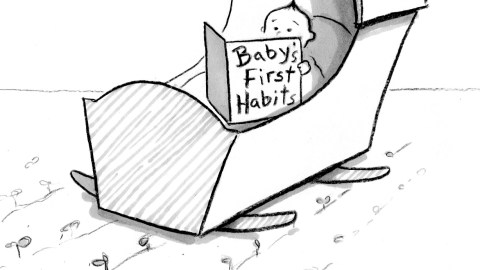Our First Nature Needs Second Natures

It is in our first nature to need second natures. We are born to acquire new habits which give us access to a behavioral toolkit that is nowhere in our genes. But this otherwise wise strategy means we often act without consciously thinking.
1. You, at this precise moment, are using two second natures (one easy one hard). English is a particular configuration of your first-nature language system which, if acquired early, became a second nature easily and automatically. But reading is a second nature skill needing hard slow schooling.
2. Language is innate but using text is “painstakingly bolted on.” Maryanne Wolf notes that reading has “no direct genetic program passing it on…” It can’t have: text has been widely available for only about 20 generations, and most of us have illiterate ancestors much more recently.
3. Yet you are using your painstakingly acquired textual skills effortlessly, decoding this string of symbols without a second—or even a first conscious—thought. That thoughtlessness is a second-nature miracle, which billions of us routinely repeat.
4. Darwin understood the importance of second natures noting that: “anything performed very often by us, will at last be done without deliberation or hesitation, and can then hardly be distinguished from an instinct” and that “nature by making habit omnipotent, and its effects hereditary, has fitted the Fuegian” to his environment. Those short sentences sow the seeds of ideas still insufficiently harvested and of confusions yet unclarified.
5. Habits are “omnipotent” because repetitive behavior is mainly what evolution works on. In calling the effect of habits hereditary Darwin followed Lamarck who believed that acquired traits could be inherited. Though falsified for first natures, that idea is fitter for second natures (= acquired behavioral traits, which are culturally inherited and cumulatively improved).
6. Born with brains far from finished, we evolved to absorb easily, or acquire arduously, the second nature habits of our culture. This gives us a behavioral toolbox that can adapt much faster than our genes, and means we can avoid reinventing behavioral wheels.
7. But second-nature behaviors tend to be triggered automatically. We consciously think before we act less often than we think we do. Instead we spend much of our lives thoughtlessly reaping the repeated harvest of habits previously sown.
8. The sapiens in Homo sapiens means wise. But much of our wisdom isn’t individual, it’s collective, relying on the solutions of wiser others.
Reason dictates that we should choose our second natures wisely, since force of habit ensures we will repeatedly enact them without deliberation. We are habit-forming and habit-farming animals.
Illustration by Julia Suits, The New Yorker Cartoonist & author of The Extraordinary Catalog of Peculiar Inventions.





